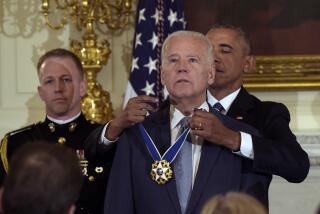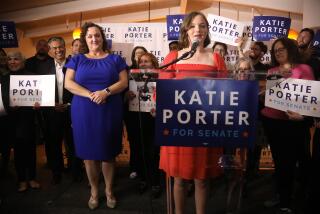Perot Outsider Status Begins to Erect Obstacles : Independent: His lack of a political mooring has already helped put him on defensive over questions about past behavior.
- Share via
WASHINGTON — The outsider status that has energized Ross Perot’s undeclared presidential candidacy is creating potential obstacles on his road to the White House--and these stumbling blocks are likely to become larger as voters take a more sobering look at their ballot choices.
The threat was underlined last week when, for the first time since Perot thrust himself to the fore, the maverick billionaire was forced on the defensive by a flurry of allegations about his past behavior. Critics contend the charges, which center on his hard-driving business methods and his alleged penchant for private investigations, cast doubt on his fitness for office.
These so-called “character” questions take on extra significance because of the special challenges Perot will face as an independent novice candidate who lacks traditional political moorings or experience.
Although Perot has sought to brush aside the criticisms of him, the seeds of doubt already have been planted among the voters, polls show.
In a recent national survey conducted jointly by the Democratic firm of Greenberg-Lake and Republican pollsters Tarrance & Associates, 24% of Perot’s own supporters cite his lack of party or congressional support as their biggest concern about his candidacy. The fact that he has never held public office, cited by 18% of those interviewed, ranked second in the worry category.
To encourage such doubts, his rivals are starting to suggest that instead of providing solutions, Perot’s disconnection from the system will aggravate the very problems that have fostered voter discontent and sparked his candidacy. “Electing Ross Perot wouldn’t fix the deadlock between the elected branches; it would make this worse,” is the way Vice President Dan Quayle recently put it.
Moreover, Perot’s critics believe that argument will be powerfully reinforced as the questions being raised about Perot’s temperament--his sometimes cantankerous response to opposition and his seemingly high-handed approach to problems--gain more attention from voters.
“The argument against him has to be that even if he were a really good guy it would be bad for the system and bad for the country to have a guy come in from nowhere and be President,” says a senior adviser to Quayle, explaining the strategic thinking underlying the vice president’s speech. “But he’s not a particularly good guy,” this staffer insists, citing reports he contends reflect a pattern of willful aggressiveness bordering on ruthlessness.
There are other drawbacks to what detractors call Perot’s “Lone Ranger” approach to politics and governance.
For one thing, despite the current sorry state of political parties, they still exercise a strong residual tug of loyalty on voting patterns. As Election Day draws nearer, says University of Pittsburgh presidential scholar Bert Rockman, “the questions get harder, the focus gets more intense and people tend to go back to their political homes.”
Finally, if the election ends up in the House of Representatives because no candidate ends up with 270 electoral votes and Perot lacks a commanding lead over his rivals, his candidacy could be doomed by the allegiance of the lawmakers to the two major parties.
These potential roadblocks are in striking contrast to the smooth and fast track which Perot had traveled until recently. He owed much of his dazzling start to his success in avoiding direct linkage to either of the parties.
For many voters, “that’s his biggest asset,” says Kathleen Hall Jamieson, dean of the University of Pennsylvania’s Annenberg School for Communication, who has been conducting periodic interviews with a group of 100 voters scattered around the country. “He’s not bound to anybody, so he’s not part of the problem that the term-limit movement is trying to address,” she said, referring to the drive to limit the time politicians can spend in office to try to keep them responsive to their constituents.
Perot and those close to him have sought to cast him as a sort of nonpartisan ombudsman, operating on a loftier plane than either of the two parties.
“All of a sudden here comes somebody who rolls in a grenade and says, ‘Fellows, we have to talk about problems and issues, and if you don’t do it I’m going to,’ ” says a senior Perot adviser, Morton H. Meyerson. “I think he’s putting it to them.”
Not only has Perot kept his distance from the established parties, but--unlike any of the major independent presidential candidates of the past--he has avoided setting up a party of his own, and apparently has no intention of doing so.
“He doesn’t want to form a new political party,” says Meyerson. “He wants the current political parties to get better.”
But by breaking with the existing parties and refusing to set up his own, Perot is steering a risky course, one that could foster doubts about whether he represents anything more than transitory change.
“People still cherish their vote and don’t cast it away lightly,” said John B. Anderson, who created the National Unity Party as a vehicle for his independent candidacy in 1980. “And if they feel they are simply voting for someone who, like a morning glory, is going to bloom for a while and then die, they may be less inclined to go to his banner.”
After a promising start to his candidacy, Anderson garnered less than 10% of the vote in the 1980 election.
Another potential problem for Perot in not being linked to any political institution, or in failing so far to establish any clear set of programs he would carry out as President, is that he depends on his own personality to establish his credibility as a potential President.
Already this has fostered press scrutiny of Perot’s past behavior and idiosyncrasies--scrutiny that has aroused his ire and appeared to increase his negative ratings in the polls.
The challenges facing Perot are likely to get even tougher, many analysts believe, given that independent candidates for President have almost always faded in the past.
“The outsider argument wins July polls; the insider argument tends to win November elections,” says University of Virginia analyst Larry Sabato. He believes that by autumn, voters will be increasingly uneasy over the problems Perot would face as a President untested by previous political battles and forced to contend with dual opposition parties in the Congress--and on the traits he would bring to that task.
Perot himself has yet to address this issue directly. But recent interviews with his top aides suggest the arguments he would probably use when the question of his governing ability arises, as it almost certainly will.
Right now, his advisers are counting heavily on the dramatic impact of a Perot victory to smooth his path on Capitol Hill. Tom Luce, overseer of Perot’s campaign, said the election of an independent to the presidency would be tantamount to a political “earthquake.”
“That would send a very clear signal to anybody unless they were blind and deaf,” he said.
Once cloaked with the prestige of office, Meyerson contends, Perot could rely on patriotism to rally support from members of the two established parties.
“They may not agree with him,” he says, “but I believe that if a President of the United States stands in front of you and says, ‘Your country needs you and needs your support; come work with me on this problem,’ I don’t believe a congressman or a senator will say no.”
But political professionals are prepared to argue to the voters that Perot is not well suited to the tasks he would face as President. His background as a high-powered wheeler-dealer Texas businessman, contends Paul Tully--political director of the Democratic National Committee--offers “very little evidence of capacity to make majorities out of those who don’t have to fear their status on the payroll.”
For Perot, the ultimate test of an outsider’s ability to succeed in politics could come if the election ends up in the House of Representatives.
In that case, the Perot campaign is counting on members of the House to follow the November election returns.
“My guess is that during the campaign you are going to see voters take the position (toward congressional candidates) that we are electing you to represent us in Congress,” Meyerson says. “And when it comes down to the vote for President, we want you to look at how we voted in this district. And that’s the way we want you to vote. And if you play games with us we’ll revolt.”
If Perot decisively bests his two rivals all across the country and only barely falls short of an outright electoral majority, Meyerson may be right.
But if the vote is more evenly divided or shows clear regional differences, the Perot camp’s expectations may prove unrealistic. Under such circumstances, strong pressures would be exerted on both Democrats and Republicans by leaders of their parties.
In fact, that pressure has already begun.
“Democrats in the House have an obligation to their constituents,” Democratic National Chairman Ronald H. Brown said recently.
More to Read
Get the L.A. Times Politics newsletter
Deeply reported insights into legislation, politics and policy from Sacramento, Washington and beyond. In your inbox three times per week.
You may occasionally receive promotional content from the Los Angeles Times.










